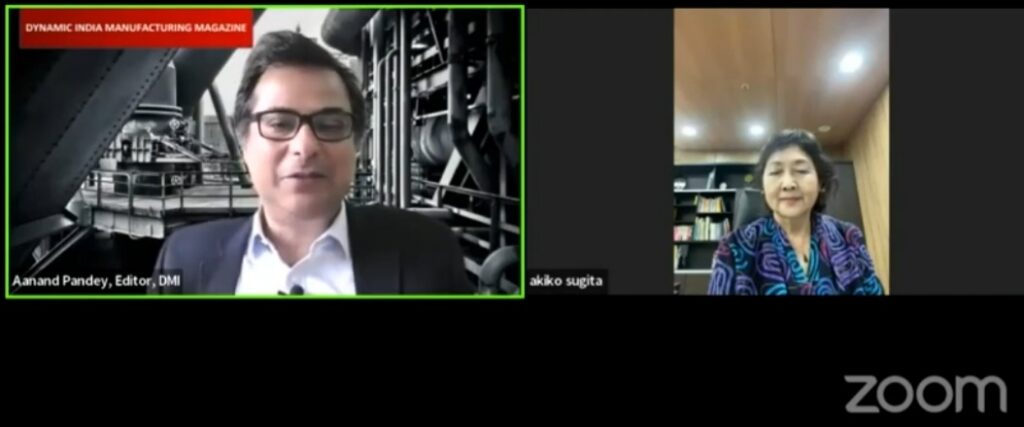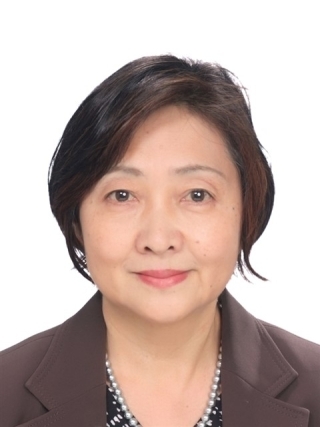Consul-General Ms. Akiko Sugita spoke about Indo-Japanese collaboration, manufacturing, and a host of related subjects.
During the Industry Samurai Awards and Conference 2021held virtually, we had the honor of hosting as our Keynote Speaker, Ms. Akiko Sugita, the Consul-General of Japan. Ms. Sugita spoke about Indo-Japan relations, and the industrial sector, and noted the greatest strengths that the industries and the people of both countries have, which can benefit the two economies.
Prior to the current role, Ms. Sugita has held the role of Counsellor, Embassy of Japan in Singapore. Secretary-General Foreign Press Center, Japan. Principal Deputy Director Public Diplomacy Strategy Division, Minister’s Secretariat, Ministry of Foreign Affairs of Japan.
She has studied humanities specializing in History from Williams College, U.S.A and from Tokyo University of Foreign Studies, Japan specializing in Spanish.
In 2004, she also wrote a book in Japanese, International Manners, and Rules for Business Persons. She wrote this book while working at the Office of Protocol, Ministry of Foreign Affairs of Japan. During this time, Ms. Sugita’s duties included being part of a task force that was responsible for the preparation of the funeral ceremony of His Majesty Emperor Showa in 1989, as well as organizing the Enthronement Ceremony of (the then Emperor) His Majesty Emperor Emeritus in 1990. It was here that she resolved to write a book for business people so that they may learn more about business etiquette and the necessary protocol in order to fit in better and work in different cultures and social practices. Sharing edited and abridged excerpts from her speech and a Q&A with DMI editor Aanand Pandey.
Consul-General Ms. Akiko Sugita: I would like to talk about the Japan-India relationship with a focus on cooperation in the manufacturing industry. Japanese investment in India stands as the fifth-largest at US$ 35.4 billion during the years 2000-2021. The bilateral trade between Japan and India amounted to US$ 13.4 billion from April 2020 to February 2021. Out of which exports from Japan to India was US$ 9.5 billion, while that from India to Japan was US$ 3.9 billion.
More than 100 Japanese investors have funded 240 Indian start-ups and have made 360 deals between the year 2000 and May 2021. The number of Japanese companies grew up at a compound annual growth rate (CAGR) of 7% from 2010-2020, reaching a total number of 1,455 companies with 4,948 operational establishments throughout India as of October 2020.
During the Covid-19 crisis, global companies learned that a great risk arises from heavily depending on one single country for production. There is an increasing awareness amongst Japanese companies to move their overseas manufacturing bases from China or other vulnerable countries or to choose a plus-one strategy to diversify and strengthen their supply chains.
In a survey conducted in 2017, India has been ranked as one of the most attractive destinations for investment by Japanese manufacturing companies. There are, in fact, several reasons for choosing India as a (preferred) destination. First, India has a big and growing market. Second, India has a rich and talented human resource, Japanese companies are in dire need of the IT talents of India. Third, India is a global outsourcing hub. Fourth, India’s software technologies have great competitive advantages. And finally, global manufacturing giants have R&D centers in India. I believe there is great potential for India and Japan to explore further collaborations to enhance the competitiveness of the Indian manufacturing industry.
Prime Minister Narendra Modi launched make in India for the development of the manufacturing industry in India. The world-standard Japanese manufacturing companies are aiming at establishing a new business model for collaboration between Japanese hardware technologies and Indian software technologies. The outcome will be infinite. The Ministry of Economy, Trade, and Industry (METI) in Japan and the Ministry of Industry and Commerce of India launched Japan-India IndustrialCompetitive Partnership in 2019, in order to enhance the competitive strategy of industries in India discussions are underway to build industrial parts and promote direct investments, reduce logistics costs and facilitating the licensing procedures.
If I may introduce the ongoing efforts made by the government of Karnataka, a Japanese industrial township was established about 80 km away from Bengaluru. We have two useful dialogue platforms between the Karnataka government and the Japanese business community in Bengaluru. The main purpose of this dialogue platform is how to solve issues pertaining to Japanese companies such as road connectivity, water and energy supply, and acquisition of land, among others. Both sides should continue this dialogue and make proposals for each other to find good solutions because those companies that have already established their manufacturing bases in India will act as a model case for those companies who will aspire to come to India in the future.
Lastly, the year 2022 marks the 70th Anniversary of the establishment of Japan-India diplomatic relations. I hope that this milestone will create greater opportunities to strengthen bilateral relations between Japan and India to deeper mutual understanding and that will bring about the people-to-people exchange is not just business and tourism sectors alone but also in academic and cultural platforms as well.
In conclusion, I would like to thank you once again for this opportunity to address you all.
DMI Editor: Thank you Consul-General, Ms. Sugita. Japan has been hit by natural disasters time and again and is therefore known to have developed a culture that is resilient and tenacious towards crises. What is your message to our industry stakeholders in dealing with the challenges brought about by the pandemic in the last two years?
Consul-General Ms. Sugita: As you all know, Japan has suffered from many natural disasters such as earthquakes, volcanic eruptions, tsunami, and typhoons. In recent history, about 10 years ago in 2011, the Great East Japan earthquake hit the north-eastern region of Japan with a magnitude of 9.0. The massive tsunami washed away 600-km long coastal areas of the north-eastern and left 500 sq. km of land underwater. It resulted in 20,000 casualties and destroyed about 4,00,000 houses and stopped 270 rail routes and left 24,000 hectares of agricultural land underwater. Japan’s gross domestic product (GDP) in the second quarter of 2011 plunged to -2.1%. The government of Japan estimated that the total loss was approximately US$ 210 billion. A triple disaster of earthquake, tsunami, and nuclear meltdown had cut off access to the supply chains from north-eastern of Japan to the world. There were major auto parts and electronics product parts industries in the region. These companies relied heavily on their particular product supply had to find other suppliers quite quickly. So, through the Great East Japan earthquake, just like the coronavirus pandemic, I think we learned a lesson that the manufacturing industry should diversify the supply chains and make them more resilient and secure production. I think that is the wisdom we have to share with the world.

DMI Editor: What are the biggest strengths of India’s manufacturing industry from your perspective?
Consul-General Ms. Sugita: The Indian manufacturing industry has competitive advantages in five areas. First, is the growing big market. Second, human resources. Third, strength as a global outsourcing hub. Fourth, the strength of software technologies, and fifth is the presence of R&D centers of global manufacturing giants in India.
Having lived in Bengaluru for 18 months, I personally believe the real strength of India also lies in the quality of Indian people. Many people that I have met in Bengaluru hold open and flexible views and think very efficiently. They also demonstrate very skillful social and professional manners of handling meetings and making presentations, while at the same time making other people feel at ease. These are a set of great features required for global leaders, especially in business anywhere in the world.
Question: You wrote a book titled ‘International Manners and Rules for Business Persons’ some years ago. Can you share with us the premise of the book and how the idea behind it emerged?
Consul-General Ms. Sugita: I wrote this book about 16 years ago. As I was working for the foreign service, I was particularly interested in the area of protocols, which is the root of diplomatic relations you handle. For example, when receiving an official state guest of one country or having a ceremony to entertain the dignitaries of a particular country, I thought we must disseminate the information to the business community in Japan also because there are lessons which we can share with the business world as well. These are a set of standard rules that apply to any country that handles diplomatic relations with other nations. At the same time, I was also interested in the vast cultural differences in various social manners. Since I have lived in the US, Singapore, and India, I had noticed several differences when compared to the customs of Japanese businessmen. In Japan, for example, businessmen usually exchange meishi(business cards) in a particular manner. You may have noticed that rather than looking at each other, they (prefer) to hand over the meishi to their business partners and then recognize what designation or title they may hold and what company they represent, it is only after that they initiate a conversation. I think it is related to the Japanese idea of seniority (hierarchy). In Japan, someone who is senior to others is quite important. So, by looking at the designation and the company’s name, they can analyze who is senior or junior respectively. They tend to focus on the titles and company names too much. In the global community, however, I don’t think it is always the truth. For example, most Indian people just start their conversations without necessarily exchanging meishi. Of course, there are occasions when you do receive business cards but they tend to follow a more relaxing manner to initiate any business discussion. It is likely that they may want to know what this person is thinking about a particular agenda rather than caring about the titles or designations. That is the subtle difference.
Another difference I noticed is the Indian habit of acknowledging in affirmation with the nodding of the head sideways. However, in Japan, this gesture would actually mean an outright no. In fact, when we agree, we tend to bow. When I visited India, I naturally adopted this custom of nodding the head as an acknowledgment to what an individual is saying. So, there are such minor cultural differences, which I have noticed over the years.
By – Rajiv Dogra
E copy of the magazine – https://www.machineinsider.com/dynamic-manufacturing-india-nov_dec-2021-edition/

